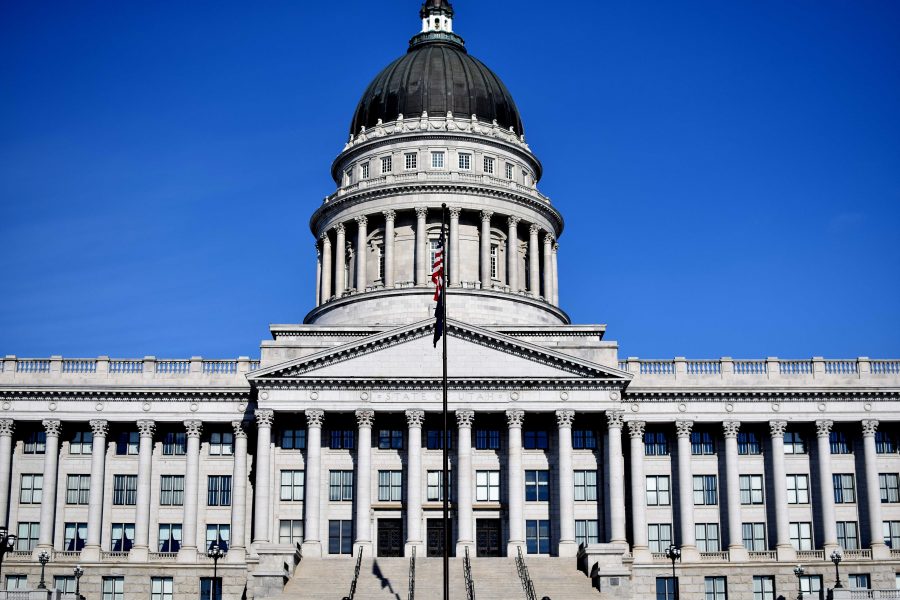Mendenhall: Expanding Medicaid Coverage for Postpartum Women
Utah State Capitol. Chronicle archives.
March 13, 2023
Medicaid is a state-funded program that covers medical services for specific individuals, including the elderly, pregnant women and their children, and people with low incomes.
The services and conditions that a pregnant and/or postpartum mother could receive is discussed in both H.B. 84 and S.B. 133. Both bills aimed to extend the Medicaid coverage for postpartum mothers, with varying language in when such coverage would apply. While S.B. 133 passed and H.B. 84 did not, the legislation to extend Medicaid services for postpartum women is essential in minimizing gaps in healthcare needs when switching providers.
Pregnancy Healthcare
Prenatal and postpartum health care is necessary for both a mother and her baby. Prenatal visits help monitor the condition of a baby and can identify any problems or complications early on. It also helps prepare for the impending birth by creating a birth plan and knowing important delivery expectations. Postpartum care is equally as important — mothers go through many physical and emotional changes during this time. Prioritizing physical and mental health, as well as proper rest and nutrition, is key when healing from pregnancy.
According to the Peterson-KFF Health System Tracker, it was found that healthcare costs associated with pregnancy and postpartum care averaged to be about $18,865. However, for women enrolled with a private insurance plan, their out-of-pocket responsibility averaged $2,854.
“The 2023 numbers are that if a pregnant woman makes more than $10 an hour that’s too much money to qualify for Medicaid coverage for pregnancy,” said Rep. Rosemary Lesser, sponsor of H.B. 84. This puts women that can’t qualify for Medicaid, but also don’t have a private insurance plan, in an extremely difficult position considering healthcare is far too expensive. And with claims that Utah is a pro-family state, you’d think that we’d be able to support expecting mothers adequately rather than in our subpar and limited way.
Per Utah’s current Medicaid program, a mother’s medical care will be covered from when she turned in an application until 60 days after birth. After that period is over, their child will be eligible for Medicaid for the first year of their lives. All things considered, Medicaid offers fairly good coverage for the limited population that are actually eligible. The policy itself just needs to improve in accounting for gaps in healthcare. Whether that means changing the eligibility standards, or just extending coverage, either of these changes would greatly benefit pregnant women.
Gap in Healthcare Post-Medicaid
A main point of Medicaid is to offer healthcare coverage to pregnant and postpartum women who may not have a private insurance plan.
“The reality is the majority 66% of all pregnancies in the state of Utah are covered by private insurance,” Rep. Lesser said “And of course, private insurance doesn’t stop at the 60-day mark.” And for the remaining 34% of pregnancies that aren’t privately insured, these mothers often experience gaps in healthcare when switching healthcare provider plans. These gaps occur when Medicaid coverage ends and a provider is no longer in-network.
“A gap in healthcare is really problematic,” Rep. Lesser said. “They will find that the doctor with whom they had a fantastic relationship, suddenly they are no longer in that person’s panel and they find somebody else.”
Speaking from experience, changing healthcare providers in the middle of any form of treatment is inconvenient and harmful. When you consider the more fragile mental state that postpartum mothers may be experiencing, disrupting mental health treatment can be incredibly damaging. Even from a physical standpoint, the effects of pregnancy last significantly past giving birth, which is why we need to extend Medicaid coverage to a full year and get such a policy enacted urgently.
A Representative’s Take
H.B. 84 initially planned to expand the Medicaid coverage that ended “on the last day of the month that is 60 days after the day on which the woman’s pregnancy ends.” This amendment would have been enforced starting July 1, 2023.
The substitute bill, S.B. 133, passed and was sponsored by Sen. Wayne Harper. S.B. 133 will “extend the duration of postpartum coverage for certain women,” but won’t be enacted until Jan. 1, 2024.
Rep. Lesser explained how she supported both bills.
“I believe even though I would rather see it go into effect in July, at the end of the day, it’s more important to me to win the battle and have women cared for than it is to stomp my feet and say they could be cared for in July,” she said.
Lesser and I share the same opinion: postpartum women deserve longer healthcare coverage after pregnancy to eliminate gaps in treatment and improve overall care.
I advocate for pregnant and postpartum women because I’ll likely experience being a pregnant and postpartum woman in the future, so I want to see our legislature help these women before I think about having children. Seeking basic necessities like healthcare after delivering a baby (or experiencing a miscarriage) is essential and needs to be prioritized in the state of Utah.








